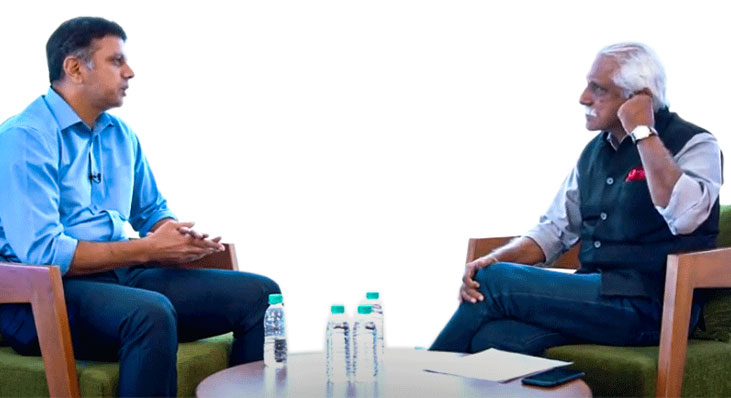Sporting qualities such as talent, hard work, integrity of purpose, respect for the opposition and the spirit of the game need to come together to achieve long-term consistency and success for sportsmen in their chosen field, said Rahul Dravid, former captain of India cricket team.

In a Q&A session titled Truth Talks with sports journalist Ayaz Memon, at the virtual Rotary institute, he said, “sportsmanship is important for we have to respect the rules, regulations and understand the larger purpose of this activity. Don Bradman put it right that ‘you are just custodians of that sport for the time you are in it.’ It is not just that one is there in the field only to win, make money for 10–15 years and then move out.”
The 1983 World Cup win has changed the cricket scenario in the country. Till that time “Test cricket was the craze and along with other budding talent in the 1970s–80s, I aspired to become another Sunil Gavaskar, Gundappa Viswanath and Kapil Dev.”
“Sports is not just about winning or losing and getting financial benefits, but the respect you earn among youngsters in the country. It is all about how you carry and conduct yourself, for you do what you love and inspire the youngsters.”
Facing setbacks, failures
How did Rahul Dravid cope with disappointments, setbacks and failures in his career? Of course, not able to win a World Cup and getting knocked out early in the 2007 tournament still rankles him. “I had to face such failures and learn from it, but couldn’t dwell on it for long as we have to look ahead. We can’t think hard on past setbacks.” In 2004, Dravid led the Indian team for one Test series win against Pakistan on their home soil, then toured West Indies and won the series there after 35 years; and finally, beat England on its home turf in 2007, recalled Memon.
Greats like Gavaskar, Sachin Tendulkar and Dhoni gave up Test captaincy after a series of losses, “but you gave up the leadership after a series win in England. Can you explain that,” he asked.
Replied Dravid: “Soon after the series win in England, I realised that one needs to give 100 per cent energy and mental space for the captaincy and I felt that I was not there, it was dragging on me. I was mentally and physically drained and could not take it forward. So, I decided to give it to someone else.”
On captaincy qualities, the Wall of Indian cricket said, “it has to be a consensual leadership for gone are the days of an authoritarian or dictatorial tenor with information explosion giving rise to a need for pooling in collective intelligence, knowledge to achieve better results.” An India cricket captain must be able to blend harmoniously the collective skills and talent of his team members to achieve results on the ground, he said.
After winning the Under-19 World Cup in 2018, Dravid as head coach got extra money, but “I asked for equal distribution of prize money (to support staff) as it is team effort and everybody contributed for our win.”
Dravid goes by his conscience and that is why he turned down the offer of honorary doctorate from the Bangalore University. “My mom got a doctorate in art at the age of 56–57. So we have two doctors in our family (his wife is a surgeon). But I did not feel like accepting this award from the university for personally I don’t fit into this. I have got several awards such as ICC Player of the Year Award, Padma Shri, Padma Bhushan, etc for my cricketing abilities.”
Having conversations such as this one on sporting principles, roles, challenges, and acknowledging the mistakes of the past and learning from it is a great platform, Dravid added.





